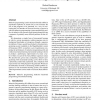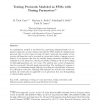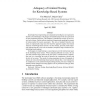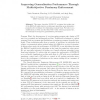65 search results - page 3 / 13 » Test generation through programming in UDITA |
AAIP
2009
13 years 8 months ago
2009
Inductive programming systems characteristically exhibit an exponential explosion in search time as one increases the size of the programs to be generated. As a way of overcoming ...
CN
1999
13 years 7 months ago
1999
An optimization method is introduced for generating minimum-length test sequences taking into account timing constraints for FSM models of communication protocols. Due to active t...
TITS
2008
13 years 7 months ago
2008
Abstract--In this paper, the implementation of genetic programming (GP) to design a controller structure is assessed. GP is used to evolve control strategies that, given the curren...
IJAIT
2000
13 years 7 months ago
2000
Knowledge-based engineering and computational intelligence are expected to become core technologies in the design and manufacturing for the next generation of space exploration mi...
GECCO
2004
Springer
14 years 26 days ago
2004
Springer
This paper describes POPE-GP, a system that makes use of the NSGA-II multiobjective evolutionary algorithm as an alternative, parameter-free technique for eliminating program bloat...




